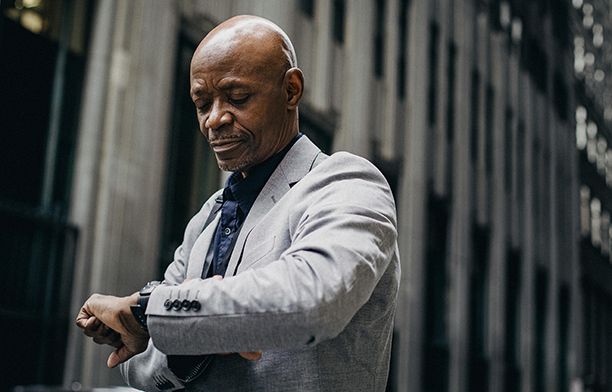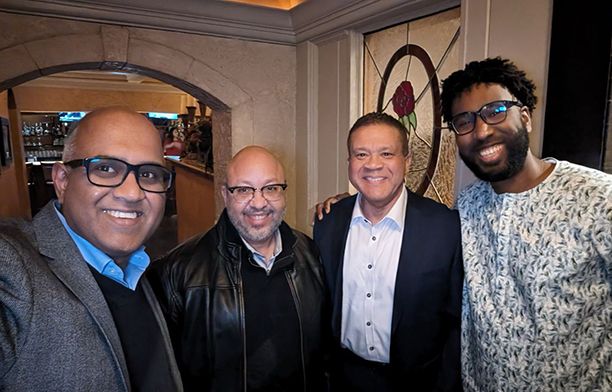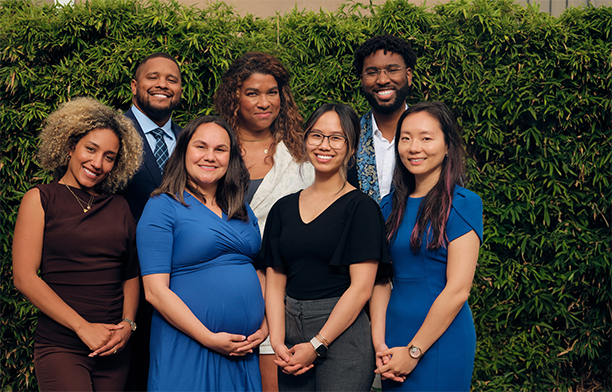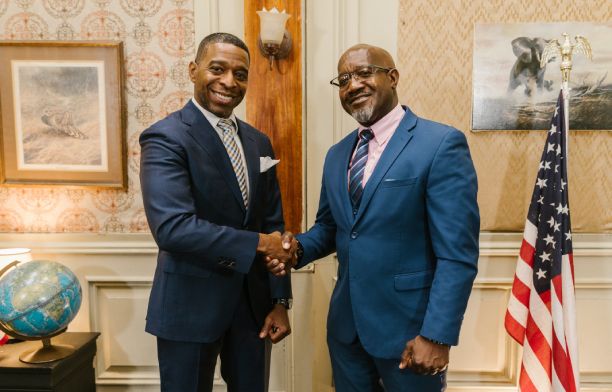To be clear: there's support for Black entrepreneurs and business owners; it's not just to be found where we've been looking, but it's waiting for us where we've mostly ignored: our local communities.
Likewise, as entrepreneurs, we really have to keep our creative and entrepreneurial fire burning in the Black communities were its needed the most, until the community catches onto the fire. When they see what you see, they'll be willing to support it.
I'll let my personal experience tell a better story and lead your expectation in the right direction.
Key Takeaways
- My move to Silicon Valley and brief return to Alabama helped me understand that success can start anywhere, and local engagement is crucial.
- Relationships are important to business success. Some of the friends we grow up with can be a great support system in the future.
- Top Black entrepreneurs have challenged the narrative that "success is tied to certain cities and only achievable through external support."
Disclaimer
The contents of this article are for educational purposes only. They are not intended to be a source of professional financial advice. You will find experts on financial planning and financial management here.
An instructive story of delayed success

Growing up in a small city in Alabama and having entrepreneurial parents who were great examples of reaching for big achievements, my dreams were enormous, and the only way to fulfill them, I thought, was to escape to a bigger city.
But I had missed something important my parents knew at heart. They pursued careers and built businesses right in the city where the family has lived for a couple of generations. There were a number of others like them in the city. But the misconception that success was synonymous with the glittering lights of a metropolis swayed me and led me to Silicon Valley.
Arriving in Silicon Valley with big dreams, reality hit me hard. The 500 sqft apartment across the street from Stanford was a far cry from the success I had envisioned. Amidst the unfamiliarity, the only anchor was my first investor, Brian Kang. His belief in me, opening his home during our first days in the Bay Area, and the warm welcome extended to my wife and me became the foundation of my Silicon Valley journey.
Finding Truth

The above photo captures a significant moment - a dinner with influential figures such as Michael Johnson, Alameda county's judge nominee, Chappie Jones, an early advocate and former vice mayor of San Jose, and my bro Sriram, a marketing genius from SCU. Each shared story at that dinner was a living testament to the transformative power of local relationships in paving the way for business prosperity.
The dinner also served as a stark reminder of the relationships left behind when I bolted out of Alabama. Looking back, I realize that my success might have been delayed due to my lack of local engagement.
A trip back to Alabama reinforced the belief that success isn't confined to a particular location; instead, it can begin anywhere. Alabama A&M's ad, boldly proclaiming "start here, go anywhere," echoed a truth I had overlooked.
The importance of being an informed voter emerged during this journey. Insights from individuals like Michael and Chappie illuminated the complexities of the system. My perspective on politics shifted from a narrow "What's In It For Me (WIFM)" mentality to a broader understanding.
Previous political contributions, once made with a business-centric mindset, were reevaluated. I came to realize that it's not just about the donation; it's the dedication that paves the way for business success. And dedication is easier to channel towards individuals rather than abstract entities like businesses.
To my fellow Black entrepreneurs and fund managers, remember - relationships matter, and people invest in people. So, you don't need to look elsewhere for support, you'll find all you need to get going in your local communities.
Bay Street Capital Holdings: A Support House

As a Black-owned investment firm, Bay Street Capital Holdings is a hub for investors and Black entrepreneurs to back vision with provision. We believe in cultivating opportunities that transcend traditional boundaries, creating a platform where investment meets ingenuity, and the aspirations of Black entrepreneurs are not only acknowledged but passionately supported.
At Bay Street Capital Holdings, we are dedicated to rewriting the narrative, empowering the next generation of leaders to shape their destinies, and ensuring that each visionary idea finds the provision it needs to flourish and leave an indelible mark on the world.
Whether you run a venture capital firm or you're starting your own media company, you can connect with us to get you in touch with the right people who'll bring the needed boost to Black entrepreneurship.
10 Successful Black Entrepreneurs
From earlier generations to our present day, these are some of the most successful Black entrepreneurs in the United States (I've left out Black Americans with major shares in companies traded in stock market such as the New York Stock Exchange):
1. Aaron McDuffie Moore
Aaron McDuffie Moore, a Black physician, businessman, and humanitarian, was born in Columbus County to a family with roots in the Negro-Indian-Caucasian community owning land since the early 19th century. After attending elementary school and working on the family farm, Moore pursued education, becoming Shaw University's first Black physician in 1888.
Despite facing hostility in politics, he redirected his efforts to self-help, racial solidarity and Black institutions. Moore played a key role in founding the North Carolina Mutual Life Insurance Company, the largest black business in the U.S., in 1898.
His philanthropic efforts included establishing Lincoln Hospital, the Durham Colored Library, and contributing to the rural education movement. Moore served as a trustee for the Baptist orphanage and Shaw University. Moore's legacy continued through his family, with his daughter Lyda upholding his commitment to social service.
2. Annie Malone
Annie Malone, born in 1869 in Metropolis, Illinois, is one tenacious Black woman who overcame adversity in a segregated and sexist society. Recognizing the significance of appearance for Black women, she developed hair products to empower them against societal beauty standards.
Facing challenges, Malone founded Poro College in Missouri, offering cosmetics education and employment for African Americans. Her products gained international success, contributing to her wealth in the 1920s.
Despite subsequent setbacks, including a bitter divorce and the Great Depression, Malone's business endured, though diminished from its peak. Her legacy endures through philanthropy and contributions to African American entrepreneurship.
3. Charles Clinton Spaulding
Charles Clinton Spaulding, known as "Mr. Negro Business," played a pivotal role in leading the North Carolina Mutual Life Insurance Company from 1900 to 1952. Born in 1874 in Columbus County, North Carolina, during the Reconstruction era, Spaulding's early life on his father's farm instilled a strong work ethic and entrepreneurial spirit.
Moving to Durham in 1894, he overcame initial challenges by working various jobs while pursuing education. In 1898, Spaulding became the manager of a Black-owned cooperative grocery store, but its collapse in 1899 left him in debt.
Fortuitously, he joined the North Carolina Mutual and Provident Association in 1898, where his managerial skills caught the attention of founders A. M. Moore and John Merrick. Appointed general manager in 1900, Spaulding expanded the company's operations, eventually becoming president in 1923.
Under Spaulding's leadership, North Carolina Mutual thrived, achieving national prominence and weathering the challenges of the Great Depression by implementing strategic restructuring. He remained an influential figure, earning national business awards and participating in President Herbert Hoover's Federal Relief Committee.
Spaulding's legacy is characterized by optimism, industry, and thrift, influencing a generation of African-American entrepreneurs. He passed away in 1952, leaving an enduring impact on the African-American business community.
4. Madam C.J. Walker
Madam C.J. Walker, like Annie Malone, faced early challenges as the daughter of formerly enslaved parents and becoming an orphan at the young age of 7. After struggling with her own hair issues, Walker enrolled at Malone's Poro College, becoming a Poro agent.
Inspired by her personal experiences and training, Walker moved to Denver to sell Poro products, later developing her line, including the popular "Walker’s Wonderful Hair Grower."
In 1908, she relocated to Pittsburgh, opening Lelia College and achieving remarkable success, and in 1910 arrived in Indianapolis where she incorporated the Madam C J Walker Manufacturing Company.
Both Malone and Walker, African American women in a segregated and sexist society, not only pioneered specialized Black hair care but also became groundbreaking entrepreneurs, with Walker becoming America's first recognized, self-made female millionaire.
5. David Steward
David Steward is the Chairman and founder of World Wide Technology Holding Co., Inc. Growing up in Clinton, Missouri, Steward harbored dreams of entrepreneurship. After ten years in sales for Fortune 500 companies, he experienced a pivotal moment when, despite accolades such as Salesman of the Year, he received an empty ice bucket as a reward.
This prompted him to reassess his goals, realizing he wanted more from life. Despite financial challenges, Steward's faith and dedication to hard work fueled his belief that a combination of faith in God and a commitment to serving others would lead to his destined success.
Establishing World Wide Technology in 1990 with minimal resources and just seven employees, Steward made history by creating the second Black-owned American business to reach the billion-dollar mark, becoming one of the largest African-American owned enterprises in the United States.
His firm ranks as the 27th largest privately held company. With 85 percent control over the St. Louis-based business, Steward achieved a revenue of $17 billion in 2022, employing over 9,000 people. As of October 2023, he stood among the Forbes 400 Richest Americans with an estimated net worth of $7.6 billion and is also a co-owner of the NHL hockey team St. Louis Blues.
6. Daymond John
Daymond John, a very successful entrepreneur and the singularly named "shark" in the shark Group, is best known for founding the influential clothing line FUBU.
Despite battling dyslexia and overcoming academic struggles in language arts, John focused on excelling in math and science. His resilience and refusal to let weaknesses define him set the stage for a remarkable journey.
Originating from Hollis, Queens, New York, he began by sewing hats in his mother's basement, eventually turning FUBU into a global brand with $350 million in annual sales. John's innovative thinking led to FUBU's immense success, earning him accolades like Ernst & Young's New York Entrepreneur of the Year.
Beyond clothing, he diversified his business ventures, establishing the FUBU Foundation and expanding into entertainment. Notably, FUBU's popularity extended internationally, breaking boundaries and setting fashion trends.
Daymond John's story is one of triumph over adversity, and his illustrates how the entrepreneurial spirit and focusing on one's strengths can lead to extraordinary success. His impact extends beyond business, with his philanthropic efforts raising $1 million annually through the FUBU Foundation.
7. Janice Bryant Howroyd
In 1978, Janice Bryant Howroyd founded ActOne Group, although her entrepreneurial spirit emerged in 11th grade amid a challenging racial climate. Growing up in a segregated society, she faced adversity during school integration but persevered, propelled by her father's teachings on self-knowledge and resilience.
Janice's story exemplifies resilience, creative thinking, and a refusal to let challenges define her. Her entrepreneurial journey, marked by accolades and philanthropy, underscores the power of emphasizing strengths and overcoming adversity.
8. John H. Johnson
John H. Johnson, born in 1918, emerged as a trailblazing African American publisher, leaving an indelible mark on American media. Raised in Arkansas City and later moving to Chicago, Johnson's commitment to education led him to launch Negro Digest in 1942, marking the beginning of his influential career.
Beyond magazines, Johnson delved into book publishing, owned cosmetics companies, and held key roles in Supreme Life Insurance. Subsequent ventures included Ebony and Jet, making Johnson Publishing Company a powerhouse in African American media.
His influence extended globally, participating in diplomatic missions to African nations and representing the U.S. at international events. Recognized with awards such as the Spingarn Medal and the Presidential Medal of Freedom, Johnson's impact on media and culture remains unparalleled.
Even after his passing in 2005, Johnson's legacy lives on through his family's control of Johnson Publishing, ensuring his contributions to African American media endure.
9. Nicole White
Nicole White is the CEO and principal designer of Nicole White Designs Interiors in Sunrise, Florida. She transitioned from a career in journalism to become an award-winning interior designer.
Drawing on her background as a journalist for publications like The Village Voice, the Miami Herald, and Vibe magazine, White emphasizes the importance of editing in decorating, believing that "less is truly more." Her recent kitchen renovation in Davie, Florida, was featured on the cover of House Beautiful's 2021 Kitchens issue.
White's dual passion for interior design and writing led her to launch the blog Live Laugh Decorate, where she shares behind-the-scenes details of her design projects, affordable decor tips, and musings on interior design trends.
Recognized for her design expertise, White's firm, Nicole White Designs Interiors, was voted one of the top 25 interior design firms by the South Florida Luxury Guide. She received the Z-Gallerie Design Award in 2013 and was acknowledged as an "emerging designer to watch" by the Black Interior Designers Network.
White's renovation proficiency has earned her a role as a brand ambassador and influencer for companies such as The Home Depot, Zephyr, and CITY Furniture. However, she prioritizes her clients' passions to create personalized and unique spaces, regardless of their preferred style.
10. Tea
Tea is a co-founder of The Bronx Collab, LLC, a company that provides community spaces for small businesses to facilitate their growth.
Opportunities for networking, a deeper understanding of business operations, and occasionally, a quiet working space are essential factors for small businesses to grow, and The Bronx Collab addresses these needs specifically for micro-enterprises based in the Bronx.
As the co-owner of The Bronx Collab, Tea's motivation can be seen in his understanding that “the Bronx is rich in talent and knowledge" and "many professionals and creatives lack affordable spaces for collective professional endeavors.”
Beyond providing workspace, The Bronx Collab aligns with community needs, emphasizing cooperation over competition. The space offers amenities such as a pantry, free art space for children, and promotes volunteerism.
Tea understands the importance of focusing entrepreneurship efforts in the local community; he once stated that “it's crucial to recognize that collectively, we possess all the tools and resources needed. The more we embrace our talents, experiences, voices, and skills, the more enriched our community will become."
Which is the largest Black owned business in the US?
There are more than 2 million Black-owned businesses in the United States, and World Wide Technology is the largest Black-owned business in the country.
Co-founded in 1990 by David Steward and Jim Kavanaugh, World Wide Technology, based in St. Louis, Missouri, provides digital strategy, innovative technology and supply chain solutions to large public and private organizations around the globe.
A Final Word!

Tea's words sums up my submission that Black entrepreneurs only need to take advantage of the support in their communities.
There are lots more famous Black entrepreneurs from the sports world including Michael Jordan, Serena Williams, and Gorge Foreman; and many others from the entertainment industry who run a successful music career alongside many business ventures.
For each of these entrepreneurs, what mattered was forging relationships and building communities around themselves. Undoubtedly this involved developing character and personality that serves as their leading social currency. And at the heart of it all is integrity, resilience and expertise. With these in place, success becomes inevitable.
As Black entrepreneurs, we must be prepared to defy the odds, build uniqueness, and forge consistency. Persistence is our greatest asset.
Sources
https://www.ncpedia.org/biography/moore-aaron-mcduffie
https://www.thehistorymakers.org/biography/daymond-john-39
https://www.thehistorymakers.org/biography/john-h-johnson-40
https://northcarolinahistory.org/encyclopedia/charles-clinton-spaulding-1874-1952/
https://www.housebeautiful.com/design-inspiration/a37221351/nicole-white-designs-interiors/
https://www.forbes.com/companies/world-wide-technology/?sh=4224fc1d19c2





















